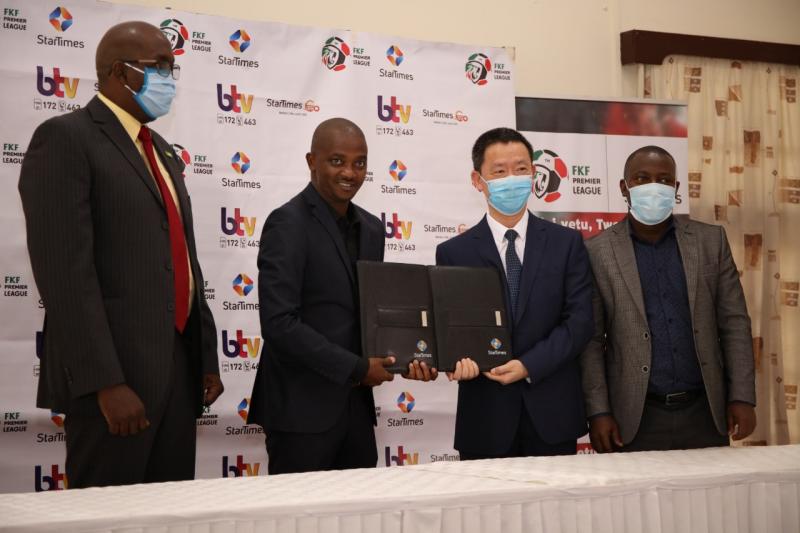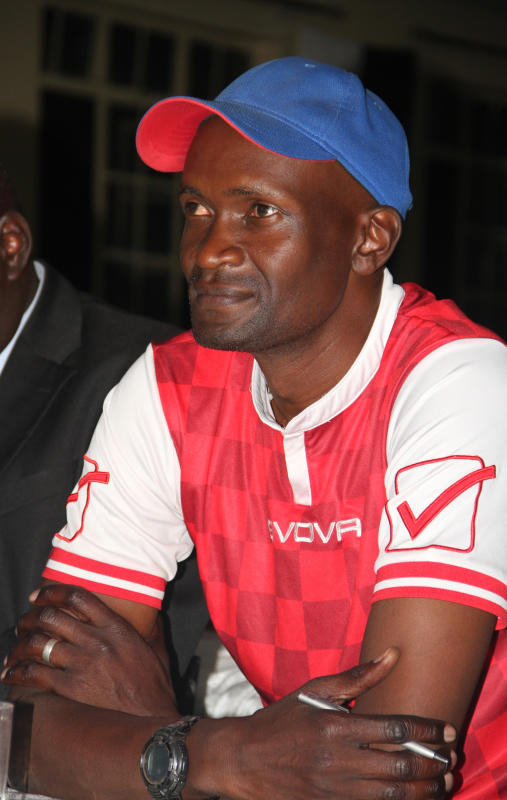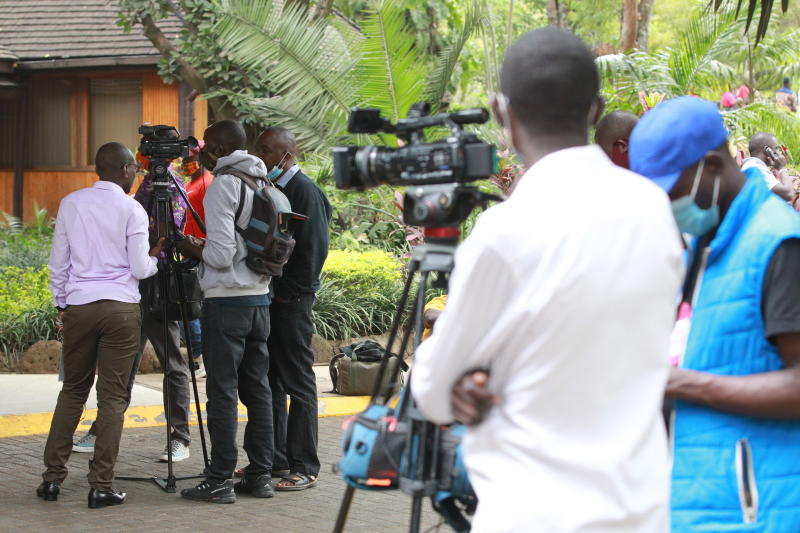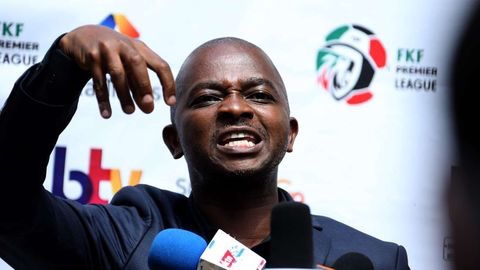Nicholas Kithuku Mwendwa is a man at war. It is not easy to tell who his adversary is because he is at war with everyone—even himself.
The president of Football Kenya Federation (FKF), who is not a man of a few words, has not killed any of his real or imagined adversaries. But people who work or have worked with him claim that he is killing football, the very same thing he was elected to promote.
And, as if to prove them right, a few days ago, he suspended two clubs from the Football Kenya Federation Premier League. Zoo Kericho and Mathare United fell afoul of Nick’s rules by declining to endorse a broadcast rights contract FKF had signed with a pay television channel. They say it infringes on their intellectual property and will bind the clubs to a life of poverty.
Nick is used to wars. He thrives on confrontation that he seeks out by making arbitrary decisions every so often. His first term in office was marked by court cases where he was either the plaintiff or defendant. Before his re-election, he had a plethora of cases before the Sports Dispute Tribunal because certain decisions he had made rubbed his opponents the wrong way.
But Nick prevailed and won the election, which had been called off more than once after some of the cases went against him.
Most of Nick’s problems as the head of FKF are self-inflicted and he gives his detractors ammunition. He is not just the head of FKF, but the face, the body and the voice, too. He is FKF and FKF is him. Period.
Yes men
He is brash, forceful and easily excitable. He loves to surround himself with yes men and does not entertain contrary opinion, even when his ideas are archaic. He sees enemies everywhere and literally shouts at the press. He does not talk to them. He either defends himself, dresses down his detractors or dismisses them.
“I have no time for time-wasters who want to sit around hotels and court houses,” Nick said on July 18, the day he announced the BetKing deal. “These deals we are doing are for FKF, not for Nick Mwendwa, and we do not care about fellows who want to sit around hotels drinking wine at night and doing funny things.”
Nick is good at making promises. He promised to do better than his predecessor, Sam Nyamweya, whose time in office was also marked with court cases and little success on the football scene. Nick is headed in that direction.
Nick inherited a broken system in 2016 that he promised to fix, but when he is asked about his promises or to account for his actions, he takes offence.
When Harambee Stars went to Egypt for the Africa Cup of Nations (Afcon) in 2019 and faltered in the first round, Nick came back a wounded man because he had excitedly promised that the team would go past the first hurdle, for the first time ever. The Sports Ministry pumped in Sh240 million for the training camp in Europe and the team’s stay in Egypt.
But when he was asked to account for the Afcon funds since the team had returned earlier than he had promised, he opened a new battlefront with a career diplomat—a man trained to think twice before speaking— the then Sports Principal Secretary Kirimi Kaberia, accusing him of frustrating the growth of the game.
His biggest promise was an Outside Broadcasting van that would allow the federation produce local matches. It could have been delivered but for lack of due diligence by Nick’s FKF which paid Sh130 million to a supplier which was declared insolvent shortly afterwards. That is how the money from FIFA went down the drain.
Now anyone who asks about the van is an enemy, in Nick’s eye.
“We did everything overboard with total transparency and all I can say is the federation is currently a creditor after WTS Group, which sold us the van, went into administration,” Nick told a local newspaper on October 16, 2019.
On the BetKing deal, he says it is worth “a record” Sh1.2 billion over a five-year period, and each club will get at least Sh8 million per season till 2025. He says the broadcasting deal is worth Sh110 million per year for seven years. This is the cause of Nick’s latest altercation with certain clubs.
The problem is that Nick just announces these deals and does not provide documentary proof even after promising to do so. This is why clubs get suspicious, and when they ask questions, he goes on the defensive.
Gor Mahia, Ulinzi Stars, Mathare United and Zoo have declined to back the broadcast deal, arguing that broadcast rights are their intellectual property and they cannot give them away cheaply or without knowing the finer details of the contract.
But Nick says the federation’s constitution stipulates that they (FKF) own the collective rights of leagues and competitions. Therefore the quartet must toe the line like the rest of the clubs that have signed up.
The details of these deals with the broadcast partner and BetKing were not made available to the clubs, but they were expected to endorse them and adhere to the ensuing rules and regulations.

Raise a ruckus
The broadcast contract is 30 pages long and certain clubs got it only after raising a ruckus. The ones that endorsed it did not even see it.
Football clubs aside, Nick’s FKF is also at war with the media, which have been his biggest cheerleaders. Like Nyamweya before him, he has a coterie of senior and influential journalists in his echo chamber. They amplify his small wins and downplay his biggest losses—and contribute to the death of football.
But on Saturday, journalists were locked out of Nyayo National Stadium during the Gor Mahia-Ulinzi match, for several unclear reasons, because in Nick’s footballing world, everything must be shrouded in mystery.
“There are certain clauses in those contracts that stipulate that I cede my club’s media and commercial rights. I cannot do that because I will not make any money,” says Ken Ochieng’, the owner of Zoo Kericho FC. “Nick wants to kill football. He wants to kill small clubs like Zoo Kericho.”
Ideally, Ken should understand these contracts better than anyone else. After all, he has been the federation’s lawyer and was part of Nick’s legal team in the cases before this year’s FKF elections. But he was kept in the dark about these deals.
Nick says the deals with BetKing and the broadcast partner are above board and will ensure a windfall for clubs. Some club officials are elated but others are seeing no windfall, just a breeze.
According to Laban Jobita, a member of the FKF Premier League board and owner of Western Stima, each club will get at least Sh10.6 million from the deals, and “that is good money considering that we had nothing.” Jobita is more than happy with the amount, which he admits is not enough.
“There is not much we can achieve with such an amount considering the FKF will have to endorse even the sponsors’ banners on the grounds during home games and how they are spaced,” says Ken.
He adds, “FKF will also decide the number of matches that will be broadcast live. If I endorse the deal and agree to cede media and commercial rights, how will I make money during all those years?
These rules have put Nick on a collision course with Gor Mahia, too, who feel they need to benefit more because of their huge fan base and standing on the continental football field.
But Jobita does not agree. “The house must be put in order,” he says. “FKF has the mandate to run the league and its rules must be followed.”
He says that clubs that do not want to toe the line should leave, and that the bigger clubs should be supportive of small clubs “because they do not play alone.”
But even as he sings paeans, he pleads with big clubs to accept the money from these deals, no matter how little, and avoid wars with the federation.
“Nick is always at war and never wants to listen to other people,” says Boniface Ambani, a former Kenyan international who played for AFC Leopards. “Football is a team sport and he cannot make decisions for the clubs without involving them.”
Ambani says Nick is not acting like a sportsman and he is “killing football.” He adds that Nick does not recognise that former players can play an important role in the growth of football. “At the moment, he should swallow his pride and sit down with these clubs instead of rendering their players jobless.”

Jobless players
With the suspension of Zoo and Mathare United, at least 60 players have been rendered jobless. And even though the federation has given them permission to move to other clubs, Ambani says no club can sign players now when they have already committed their funds and budget for the season.
“Nick thinks getting a club is easy because he is used to managing the federation without consultations. Former players would have advised him, but he wants to run things in an anti-football manner,” Ambani says.
He cites the sudden firing of Francis Kimanzi as the Harambee Stars coach and the hiring of Jacob Mulee a few days later.
“That was the worst move ever, and Nick did so without following any processes because he listens only to himself,” Ambani says. “Mulee coached me and I respect him, but he has been out of active football for long and he can add no value to the national team because football is very dynamic.”
But Jobita sees Nick’s actions positively. “That the federation has allowed players from the suspended clubs to move to other clubs means it is promoting football,” he says, adding that Nick’s deals have given clubs a lifeline.
So, it is not all doom and gloom at FKF, and Nick might as well be the saviour for Kenyan football, considering that the 41-year-old founder and CEO of Riverbank Solutions that specialises in payment solutions, knows the art of the deal—but somehow forgets to pay.
Mid this year, when the Kenyan Premier League was suspended due to coronavirus-related restrictions, Nick abruptly declared the Kenyan Premier League over and crowned Gor Mahia the 2019/ 2020 champions. Gor were entitled to Sh4 million, which they have not received to date.
“I know the financial quagmire FKF is in and if I were an owner of a club, I would not let FKF touch my money,” says a Nairobi-based lawyer with inside knowledge of FKF financials but who cannot divulge how deep the mess is for fear of breaching client-lawyer confidentiality.
But that should not worry Nick. After all, the league is going on, run by a board of club officials appointed by the federation, and 13 clubs are toeing the line even though many might not know what they signed up for.
“I was kept in the dark about the contracts yet I was FKF’s lawyer,” Ken says. He feels that Mathare and especially Zoo are being picked on because “they are a small club.”
He could be right.
Gor Mahia and Ulinzi have declined to abide by the rules but the clubs are still in the league. Ulinzi is untouchable because it is a State entity, but the saving grace for Gor seems to be the fact that Sam Ocholla, its suspended secretary general, endorsed the deal but it was disowned by the Gor chairman.
To Gor, what Ocholla signed is null and void but FKF is taking umbrage under the disowned signature to say that they endorsed it.
“That is a lie,” say sources in the Gor Mahia secretariat. “If he touches Gor, the league is over. We are too big and even the sponsors will pull out.”
But on Saturday at Nyayo National Stadium, things came to a head. The Gor media team—some of whom work for mainstream media houses—wanted to stream the match live on their social media feeds but their names were missing from the list of FKF-accredited journalists allowed in the match venue.

Denied entry
Names of journalists from other media houses were also missing from the list given to law enforcement officers by FKF and they, too, were denied entry.
Only journalists from one mainstream media house were allowed in because they were broadcasting the match on a free-to-air channel.
On Saturday, the aim was to stop the Gor Mahia media team from live streaming the match, and so, all journalists were denied entry. This led to condemnation from the Sports Journalists Association of Kenya, Media Council of Kenya and International Sports Press. Local media houses also decided to give FKF-related events a blackout.
Nick, like Nyamweya before him, is a creation of the media and did not expect such a reaction considering that officials of local sports media organisations have never raised a finger even though he unilaterally banned Standard Group print reporters from all FKF-organised events. Even national team players and officials do not speak to them.
“Nick is too powerful for the people around him,” says Gichinga Njoroge, a long-standing sports journalist who has been involved in sports development in the region for decades. “Clubs should not be bulldozed into signing deals but rather there should be consultations before contracts are entered into so that they know what is in it for them.”
Of course, this is not the first time clubs and the federation are in disagreement. It has happened before and matters were resolved without clubs getting suspended.
“Football is a people’s game, and you can call it a slum sport, but it is led by people who take the players out of those dingy situations to a better, different world,” Gichinga says. “People who can exploit the commercial gains the modern game offers and not those who want to take players back to the deplorable situation they were in before.”
As for the deals, Gichinga, who worked with the Kenya Premier League Limited when South Africa’s SuperSport were the broadcast partners, says that Nick started this mess early on when he assumed office.
“When Nick was elected, he wanted 18 teams and the SuperSport deal was for 16 teams. Solving the matter took long and delayed the start of the league. That in itself was a breach of contract,” Gichinga says.
That move, sources say, hastened SuperSport’s decision to pull out as broadcasting partners because the Kenyan Premier League was not earning it any revenue. The firm saw no sense in continuing to waste airtime on the league while Kenya’s footballing busybodies were wrangling.
The wrangles have not ended, and it seems they will not end soon. The only thing that will happen is that Kenyan football will be buried—then Nick and his friends and foes can have their wars on its grave.
There's no story that cannot be told. We cover the stories that others don't want to be told, we bring you all the news you need. If you have tips, exposes or any story you need to be told bluntly and all queries write to us [email protected] also find us on Telegram

